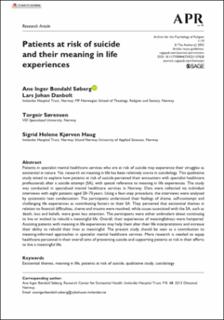| dc.contributor.author | Søberg, Ane Inger Bondahl | |
| dc.contributor.author | Danbolt, Lars Johan | |
| dc.contributor.author | Sørensen, Torgeir | |
| dc.contributor.author | Haug, Sigrid Helene Kjørven | |
| dc.date.accessioned | 2023-02-17T08:36:58Z | |
| dc.date.available | 2023-02-17T08:36:58Z | |
| dc.date.created | 2022-12-09T10:28:31Z | |
| dc.date.issued | 2022 | |
| dc.identifier.citation | Archive for the Psychology of Religion/ Archiv für Religionspsychologie. 2022, 1-19. | en_US |
| dc.identifier.issn | 0084-6724 | |
| dc.identifier.uri | https://hdl.handle.net/11250/3051796 | |
| dc.description.abstract | Patients in specialist mental healthcare services who are at risk of suicide may experience their struggles as existential in nature. Yet, research on meaning in life has been relatively scarce in suicidology. This qualitative study aimed to explore how patients at risk of suicide perceived their encounters with specialist healthcare professionals after a suicide attempt (SA), with special reference to meaning in life experiences. The study was conducted in specialised mental healthcare services in Norway. Data were collected via individual interviews with eight patients aged 20–75 years. Using a four-step procedure, the interviews were analysed by systematic text condensation. The participants understood their feelings of shame, self-contempt and challenging life experiences as contributing factors to their SA. They perceived that existential themes in relation to financial difficulties, shame and trauma were resolved, while issues associated with the SA, such as death, loss and beliefs, were given less attention. The participants were either ambivalent about continuing to live or wished to rebuild a meaningful life. Overall, their experiences of meaningfulness were hampered. Assisting patients with meaning in life experiences may help them alter their life interpretations and increase their ability to rebuild their lives as meaningful. The present study should be seen as a contribution to meaning-informed approaches in specialist mental healthcare services. More research is needed to equip healthcare personnel in their overall aims of preventing suicide and supporting patients at risk in their efforts to live a meaningful life | |
| dc.description.abstract | Patients at risk of suicide and their meaning in life experiences | |
| dc.language.iso | eng | en_US |
| dc.rights | Navngivelse-Ikkekommersiell 4.0 Internasjonal | * |
| dc.rights.uri | http://creativecommons.org/licenses/by-nc/4.0/deed.no | * |
| dc.subject | Eksistensiell omsorg | |
| dc.subject | Spiritual care | |
| dc.subject | Kvalitativ studie | |
| dc.subject | Qualitative study | |
| dc.subject | Meaning in life | |
| dc.subject | Meaning in life | |
| dc.subject | Suicidologi | |
| dc.subject | Suicide | |
| dc.title | Patients at risk of suicide and their meaning in life experiences | en_US |
| dc.title.alternative | Patients at risk of suicide and their meaning in life experiences | en_US |
| dc.type | Peer reviewed | en_US |
| dc.type | Journal article | en_US |
| dc.description.version | publishedVersion | |
| dc.source.pagenumber | 1-19 | en_US |
| dc.source.journal | Archive for the Psychology of Religion/ Archiv für Religionspsychologie | en_US |
| dc.identifier.doi | 10.1177/00846724221137620 | |
| dc.identifier.cristin | 2091062 | |
| dc.relation.project | Sykehuset Innlandet HF: 150318 | |
| cristin.ispublished | true | |
| cristin.fulltext | original | |
| cristin.qualitycode | 2 | |

